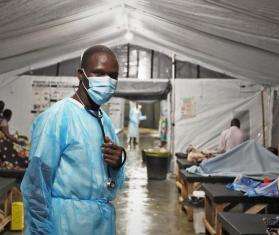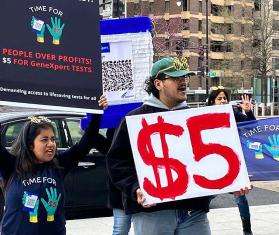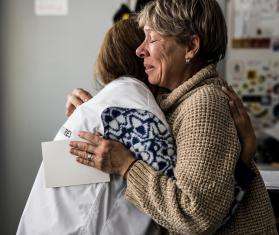A full lockdown has been in place in the West Bank for more than three weeks, with over 300 cases of COVID-19 confirmed in the Palestinian Territories. The severity of these measures, intended to prevent the virus from spreading further, is impacting the lives of more than 3.2 million people living there. While millions of people worldwide are experiencing movement restrictions for the first time, for Palestinians such restrictions have long been the rule rather than the exception, and have accompanied years of uninterrupted violence and political and social tensions.
“What is abnormal for the rest of the world is normal for Palestinians here,” said Tareq Zaid-Alkilani, Doctors Without Borders/Médecins Sans Frontières (MSF) project coordinator in Nablus, the governorate with the highest number of violent incidents between Israeli settlers and Palestinians in 2018. “Restrictions on movement are already part of Palestinians’ everyday reality. And episodes of violence in communities around the Israeli settlements and adjacent outposts are also part of this reality. There’s no difference since the outbreak of COVID-19 started.”
Psychosocial support is of the utmost importance
The outbreak of COVID-19, the subsequent lockdown, its serious effect on the financial situation of many families, and the continuous attacks against Palestinians in the West Bank are combining to worsen the already fragile situation of people facing mental distress, domestic violence, and various types of abuse.
After the Palestinian Prime Minister announced the full lockdown in the West Bank, MSF teams have had to adapt their activities to protect patients and staff from COVID-19. Group mental health sessions and face-to-face consultations have been suspended, but patients continue to receive psychological support by phone.
“The novelty of the coronavirus epidemic confronts everybody with the unknown, bringing a loss of control and a sense of powerlessness,” said MSF psychologist Samieh Malhees, who has spent the past five years providing free psychological consultations and social services to the population of Nablus . “Since the lockdown started, I have been unable to meet my patients, so I try to provide regular consultations by phone. It’s hard for me as I always try to keep my family away from the heaviest side of my job. And it’s also hard for those patients who don’t have a safe space at home where they can talk with me. But we need to keep up our program. Providing psychosocial support to people already facing a load of mental distress is of the utmost importance now.”
Continuing violence
The spread of COVID-19 in Israel and the Palestinian Territories has not stopped the violence in the West Bank. In March, clashes between Israeli forces and Palestinians continued, as did arrest operations, house demolitions, and seizures of Palestinian properties by the Israeli army. While Israeli and Palestinian authorities are cracking down on people’s movements and enforcing physical distancing in an attempt to curb the outbreak, attacks by Israeli settlers against Palestinians rose by 78 percent in the West Bank in the last two weeks of March, according to the UN.
“Episodes of physical and verbal assault, stone-throwing, damage to Palestinian property, and vandalizing cars, houses, and agricultural property are very frequent in this area, added to routinely heavy-handed operations by the Israeli military,” says Zaid-Alkilani. “The result is a pattern of widespread, relentless violence that is taking its toll on the mental health of thousands of people and the wellbeing of entire communities. This adds to the more common causes of stress and anxiety, such as family issues or lack of financial security that Palestinians share with other societies across the world. This virus and the lockdown aren’t reversing the trend.”
Violence has been a fact of life in the West Bank for decades, and it permeates domestic dynamics, creating difficulties within the home and within family relationships. For the majority of people who seek psychological support at MSF’s clinics, their distress originates in the home—for example family issues and various forms of domestic violence. Sometimes, both sources of psychological disorder—the context of recurring violence and more commonplace family matters—become intertwined and hard to separate from one another.
“One of my patients told me that her husband shouts at her and the children like some Israeli soldiers used to shout at him,” says Malhees. “Another told me that her husband became abusive after he was severely wounded during clashes. These cases aren’t isolated. I can trace a pattern where feelings of oppression, humiliation, powerlessness, and anger due to the occupation intrude on family bonding, and violence takes its course in a vicious cycle.”
Since 2001, MSF has been running psychological support programs for people suffering from mental health issues as a direct and indirect result of violence in the West Bank.
In Nablus and Qalqilya, MSF provides psychotherapeutic and psychiatric assistance, group therapy, group mental health awareness sessions, and psychosocial support activities in two clinics and in a new consultation room opened in Tubas in December 2019.
In Hebron district, our team of locally hired and international psychologists, counselors, and medical staff provide home visits, individual and group psychosocial sessions, and psychotherapy consultations for adults, teenagers, and children directly and indirectly affected by conflict-related violence.
In 2019, MSF ran a total of 5,240 counseling and psychotherapy sessions and 2,398 patients received psychotherapy support in the West Bank.





